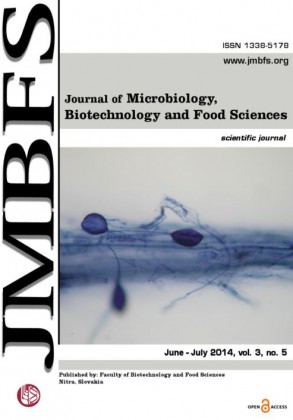INTERFERON APPLICATION CAUSES CANOLA SEEDLING BIOMASS INCREASE
Keywords:
Brassica napus, fresh weight, interferon, superoxide dismutase activity, total soluble proteinAbstract
In order to study canola (Brassica napus L.) in vitro seedling growth after seed imbibition by human recombinant interferon alpha 2b (INF) solution, the measurements of fresh weight (FW), total soluble protein (TSP) content, and superoxide dismutase (SOD) activity were conducted in 7-day-old plantlets. INF applications did not improve canola seed germination. However, FW of seedlings increased by 100% (102 IU/ml INF), 140% (103 IU/ml INF), and 70% (104 IU/ml INF) in comparison with controls (treatments by pure water, INF after boiling, or INF with diethyldithiocarbamate). Increment of FW was detected in hypocotyls and roots. TSP content was not affected in cotyledons and decreased in hypocotyls. SOD activity increased up to 2.18-fold in cotyledons and 1.47-fold in hypocotyls. Human recombinant INF alpha 2b application caused an increase in canola seedling biomass (up to 2.4-fold) during in vitro growth and we suppose that it was regulated via increased SOD activity.Downloads
Download data is not yet available.
Downloads
Published
2014-06-01
How to Cite
Sakhno, L. (2014). INTERFERON APPLICATION CAUSES CANOLA SEEDLING BIOMASS INCREASE. Journal of Microbiology, Biotechnology and Food Sciences, 3(6), 436–439. Retrieved from https://office2.jmbfs.org/index.php/JMBFS/article/view/7652
Issue
Section
Biotechnology
License
Copyright (c) 2014 Liudmyla Sakhno

This work is licensed under a Creative Commons Attribution 4.0 International License.
All papers published in the Journal of Microbiology, Biotechnology and Food Sciences are published under a CC-BY licence (CC-BY 4.0). Published materials can be shared (copy and redistribute the material in any medium or format) and adapted (remix, transform, and build upon the material for any purpose, even commercially) with specifying the author(s).

